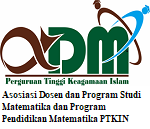Comparison Between Zero Point and Zero Suffix Methods in Fuzzy Transportation Problems
DOI:
https://doi.org/10.15642/mantik.2020.6.1.38-46Keywords:
Zero-point method; Zero-suffix Method; Fuzzy transportation problemsAbstract
Transportation is discussing the problems of distribution items from a source to a destination with an aim to minimize transportation costs. The problem of fuzzy transport is the cost of transportation, supply, and demand with a quantity of fuzzy. The purpose of the research is a study of a comparison of theories from the zero-point method and the zero-suffix method in determining the optimal solution on cost transportation. Based on the result of the theoretical comparison, it can be concluded that the process of using the zero-suffix method is shorter in determining an optimal solution in 6 steps than that of a zero-point method in 11 steps. For achieving the optimal value shows that for zero-suffix the method of occurrence iteration in the sixth step, but for the zero-point method the iteration occurs in the ninth step. The results in the numerical comparison we conclude the distribution cost using two methods is the same, based on the demand and supply obtained 7 times iteration and 7 items allocation for zero point method, while 6 times iteration and 7 items allocation for zero suffix method.
Downloads
References
P. Pandian and G. Natarajan, “An Appropriate Method for Real Life Fuzzy Transportation Problems”, International Journal of Information Sciences and Application, vol. 3, no. 2, pp. 127-134, 2011
A. Khoshnava and M.R. Mozaffari, “Fully Fuzzy Transportation Problem”, Journal of New Researches in Mathematics, vol 1, no. 3, pp 42-54, 2015
Sakawa, Masatoshi. 1993. Fuzzy Sets and Interactive Multiobjective Optimization. Applied Information Technology.
Susilo, Frans. 2006. Himpunan Logika Kabur. Yogyakarta: Graha Ilmu.
A. Thiruppathi and D. Iranian, “An Innovative Method for Finding Optimal Solution to Assignment Problems”, International Journal of Innovative Research in Science Engineering and Technology, vol 8, issue 8, pp. 7366 – 7370, 2015.
B. Satheeskumar, G. Nagalakshmi, R. Nandhini, and T. Nanthini, “A Comparative Study on ZSM and LCM in Fuzzy Transportation Problem”, Global Journal of Pure and Applied Mathematics, vol 13, no 10, pp. 7081–7088, 2017.
M.S.A. Christi and K.K Shoba, “Two Stage Fuzzy Transportation Problem Using Symmetric Trapezoidal Fuzzy Numbers”, International Journal of Engineering Inventions, vol. 4, no.11, pp. 7-10, 2015
S. Chandrasekaran, G. Kokila, J. Saju, “Ranking of Heptagon Numbers using the Zero Suffix Method”, International Journal of Science and Research, vol. 4, no.5 pp. 2256-2257, 2013.
M.R. Fegade, V.A. Jadhav, A.A. Muley, “Solving Fuzzy Transportation Problems using Zero Suffix and Robust Ranking Methodologists”, Journal of Engineering, vol. 2, no.7 pp. 36-39, July 2012.
G. Nirmala and R. Anju, “An Application of Fuzzy quantifier in Fuzzy Transportation Problem”, International Journal of Scientific Research, vol. 3, no.12, pp. 175-177, 2014
S, Ismail Mohideen and P. K Senthil, “A Comparative Study on Transportation Problems in Fuzzy Environment”, International Journal of Mathematics Research, vol.2 no.1 pp. 151-158, 2010
P. N Pandian, “A New Algorithm for Finding a Fuzzy Optimal Solution for Fuzzy Transportation Problems”, Applied Mathematical Sciences, vol. 4, no.2, pp. 79-90, 2010
P. T. B. Ngastiti., S. Bayu, Sutimin., “Zero Point and Zero Suffix Methods With Robust Ranking for Solving Fully Fuzzy Transportation Problems”, IOP Journal of Physic Conference Series, VOL. 1022, 012005, Mei 2018, doi: 10.1088/1742-6596/1022/1/012005
A.E. Samuel, A, “Improved Zero Poin Method (IZPM) for the Transportation Problems”, Applied Mathematical Sciences, vol.6, no.109, pp. 5421-5426, 2012
G. Sharma, S.H. Abbas, V.K. Gupta, “Optimum solution Of Transportation Problem with the help of the Zero Point Method”, International Journal of Engineering Research & Technology, vol.1, no.5, pp. 1-6, 2012
L. Sujatha, P. Vinothini and R. Jothilakshmi, “Solving Fuzzy Transportation Problem Using Zero Point Maximum Allocation Method”, Vol. 7, Issue 1, pp. 173-178, 2018, doi: http://dx.doi.org/10.24327/IJCAR.
P. K. Senthil, "A note on 'a new approach for solving intuitionistic fuzzy transportation problem of type-2”, International Journal of Logistics Systems and Management, vol. 29, no.1, pp. 102-129, 2018
P. K Senthil, “Intuitionistic fuzzy zero-point method for solving type-2 intuitionistic fuzzy transportation problem”, International Journal of Operational Research, vol.37 no.3, pp.418 – 451, 2020
Vivek and J. Rekha, “Optimization Techniques for Transportation Problems of Three Variables, IOSR Journal of Mathematics, vol. 9, no.1, pp. 46-50, 2013
S. Naresh kumar and S. Kumaraghuru, “Solving Fuzzy Bottleneck Transportation Problems Using Blocking Zero Point Method”, International Journal of Scientific Research and Management, vol. 3, no. 5, 2015
M. K. Purushothkumar, M. Ananthanarayanan and S. Dhanasekar, “Fuzzy zero suffix Algorithm to solve Fully Fuzzy Transportation Problems”, International Journal of Pure and Applied Mathematics, vol. 119. no. 9, pp: 79-88, 2018
M. Babenko, G. Paweł, K. Tomasz, K. Ignat, and S. Tatiana, “Computing minimal and maximal suffixes of a substring”, Theoretical Computer Science, vol. 638, pp. 112–212, 2016
B. Srinivas and G. Ganesan, “Optimal Solution for Degeneracy Fuzzy Transportation Problem Using Zero Termination and Robust Ranking Methods”, International Journal of Science and Research, vol 4, issue 1, pp. 929-933, 2012
Downloads
Published
How to Cite
Issue
Section
License
- Authors retain copyright and grant the journal right of first publication with the work simultaneously licensed under a Creative Commons License that allows others to share the work with an acknowledgment of the work's authorship and initial publication in this journal.
- Authors are able to enter into separate, additional contractual arrangements for the non-exclusive distribution of the journal's published version of the work (e.g., post it to an institutional repository or publish it in a book), with an acknowledgment of its initial publication in this journal.
- Authors are permitted and encouraged to post their work online (e.g., in institutional repositories or on their website) prior to and during the submission process, as it can lead to productive exchanges, as well as earlier and greater citation of published work







.png)




